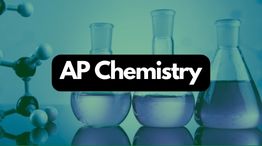
CATEGORY:
Science
AP Chemistry
Course Access: Lifetime
Free
Course Overview
AP Chemistry has been audited and approved by the College Board to provide students with a college-level learning experience. Structure and states of matter, intermolecular forces, and reactions are some of the topics covered. Students should successfully complete Chemistry prior to taking this course. AP Chemistry is especially recommended for those planning a college career path in a STEM field of study. This course includes
- accuracy and precision, error analysis techniques, mass spectrometry and isotopes One-step and multi-step mole conversions, conservation of mass and balancing equations, and modeling chemical reactions at the microscopic level.
- Solutions and solvation, electrolytes, and precipitation reactions.
- acid-base neutralization reactions, and gas-forming reactions
- heat and temperature, the universe and thermal energy, and enthalpy and thermochemical equations
- Hess’ Law and manipulating enthalpy, and enthalpy of formation.
- review of redox principles, voltaic/galvanic cells, SHE cells and reduction potentials, and electrolytic cells
Faraday calculations, electricity, and free energy. - electromagnetic spectrum, observe EMR and the photoelectric effect
- Spectra and the Bohr atomic model, and the Beer-Lambert Law.
- polarity and types of bonds
- Influences on bond length and strength, bond enthalpy, movement of electrons, and spectroscopy.
- Kinetic molecular theory, gas laws (combined and ideal), and applications of the Ideal Gas Law.
- Intermolecular forces, properties of liquids, vapor pressure, and changes of state.
- saturation and solubility curves, concentration calculations
- kinetics and collision theory
- the Equilibrium Constant, applications of K, and the Reaction Quotient
- acid-base equilibrium, common ion effect
- buffers and study buffer calculations, designing a buffer, and titration graphs.
